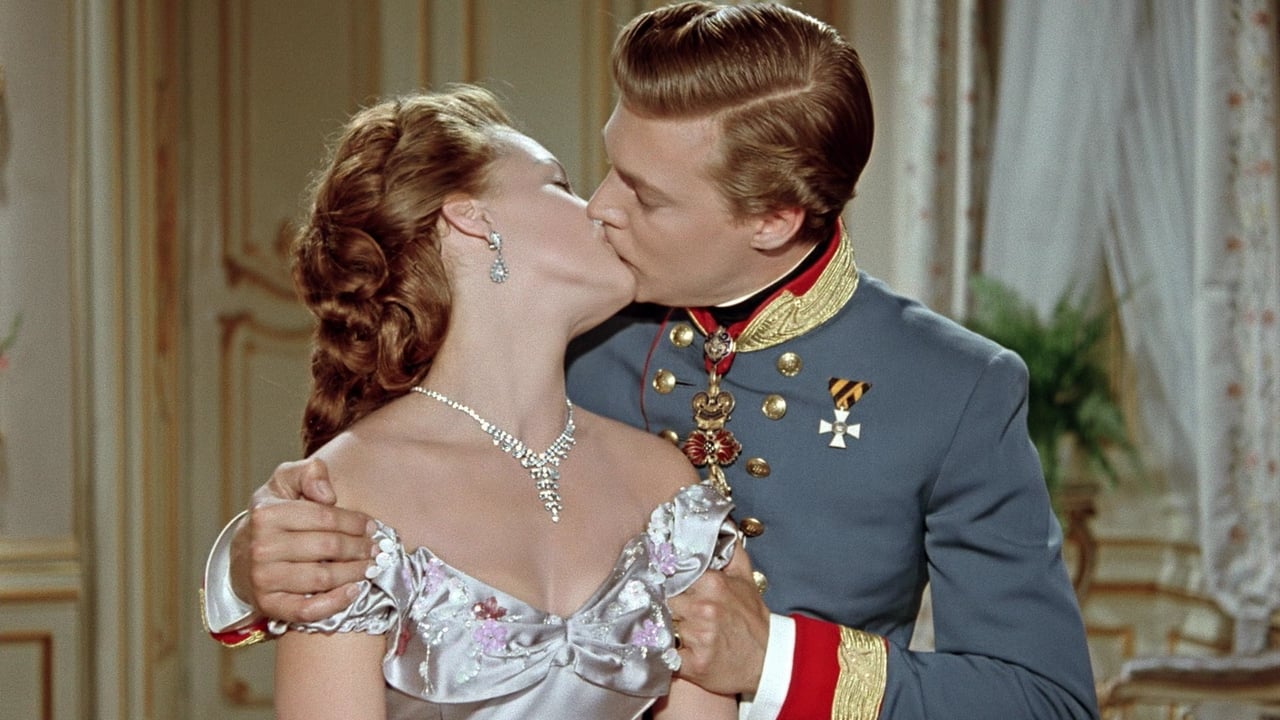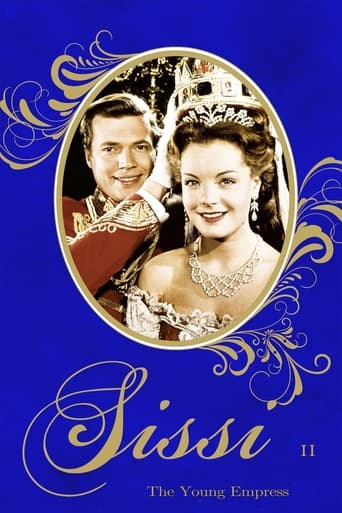

This is the second film in the Sissi trilogy. Like the first movie Sissi, this continuation is equally idealized, but here the movie actually disregards historical fact so that a more fairy-tale-like storyline can be presented. It is historical fact that by the time Franz Josef and Elizabeth were crowned King and Queen of Hungary in 1867, Elizabeth already gave birth to 3 children and her oldest child, daughter Sophie, had died. These are huge events in the lives of both parents and monarchs. Yet, in the movie, only the oldest daughter had been born, the second born daughter and third born son do not exist, and by the end of the movie no child is ever mentioned. These are serious omissions which can be problematic if the viewer assumes the story as told in the movie is historically accurate. It's not. I have no doubt that some scenes were totally invented - such as the Tyrolean holiday sequence. I realize that film makers of historical drama need to take some liberties since there is no time to present all of the events truthfully and accurately. In this movie, the film makers wanted to focus on the empress's influence on the resolution of the conflict with the Hungarians. Unfortunately, it was done at the expense of leaving out the ongoing drama and suffering of the real Elizabeth - as opposed to the idealized Elizabeth presented here. Her mother-in-law's extreme cruelty toward her is minimized, and though the emperor's love for his wife was never in doubt throughout their lives, he completely failed to protect her from his mother - a situation that is not portrayed in the movie accurately. In spite of all this, the movie is still enjoyable and hopefully viewers will realize they are watching a very idealized fairy tale and will not confuse the story presented here with historical fact. The opulent ceremonies of the era, the pomp and splendor of the monarchy, are all well portrayed and definitely enjoyable to watch. I missed some explanation, even a very simplistic one, of why a dual monarchy was formed and its importance. But politics do not fit well into fairy tales, so this was likewise completely omitted.
... View MoreA few years ago, my wife and I toured Austria. Up until then, I'd never heard of Empress Elisabeth ('Sissi'). However, as we toured a couple of the royal palaces in Vienna, we heard an interesting version of the life of Sissi. Tour guides said that the popular image of the empress was far from the real lady. On more than one occasion, she was described as vain as well as 'not quite right' (a nice way of saying crazy or at least emotionally unstable). And, tour guides enjoyed regaling us with stories about her eccentricities. Some of these I know to be true (such as her obsession with her weight) and others I still haven't been able to prove or disprove (they claimed she had teeth pulled in order to make her face look thinner). Regardless, this new assessment of the woman flies in the face of the fanciful and highly fictionalized Sissi trilogy made back in the 1950s. Whether or not you'll like these films has a lot to do with whether you are looking for the real Elisabeth or the nearly Cinderella-like fictionalized Sissi. Since I am a retired history teacher, you can probably guess which version I prefer.From what I have been able to learn, "Sissi: The Young Princess" is closer to the truth than the first film, "Sissi". That's because the first film is all happiness and joy--and is hard to believe. But here in the second of three films, you see the beginnings of a schism in the marriage between her and Emperor Franz Joseph. The film seems to blame all this on Franz's overbearing mother, Archduchess Sophie. While she was clearly a dominant figure in her son's life, blaming all the couple's problems on her is overstating things a bit. Much of the problem between the pair related more to very, very different temperaments--Franz Joseph was a rather dull and hard-working man whereas Sissi was almost manic and never liked to sit still. And, from what I have recently read, Sissi seemed to have little interest in her husband.So apart from overstating the awfulness of Archduchess Sophie, what's the rest of this film like? Well, like the first one, it's filmed in magnificent color--and sure looks great with its location shoots in the mountains as well as throughout Vienna (such as in Schönbrunn Palace). And for the romantics out there who love everything royal, there is a lot to like. Romy Schneider plays Sissi with an almost cloying niceness and you can't help but like her--even though she isn't too much like the real Sissi. She is who people WISH Sissi to have been--much like the world's fascination with Princess Diana. Not, like the real Sissi--complete with coughing fits and depression! All in all, an enjoyable film that's best taken for what it is instead of what it isn't. To me, it's like a steady diet of meringue--tasty but not especially filling.
... View MoreLoved it as a romantic teenager in Holland in 1956 - now I'm a senior in Australia and still love it. It brings back wonderful memories of my youth. Sure it is sweet and most probably not a completely true story, but who cares ? I'll see it anytime, it's a shame they don't make movies like this anymore.
... View MoreContemporary critics, including ones on this site may describe as "kitsch" the Sissy series (Princess of Bavaria, Queen of Hungary, and Empress Consort of the Hapsburgs). But this is unfair. Everything must be seen in its time frame, and not retrospectively. The fact is this three part series was highly successful. So much so, it has been available in subtitled video in at least three languages I speak, Spanish, French, and English, for years. Speak to any older movie goer, who was a kid in the late 50's from Buenos Aires to Montreal to Paris, and he or she will remember Sissy fondly. I have seen many tourists in Vienna using the Sissy series as their total source of references while touring this city. This movie and the others, not only provided popular entertainment, historical education, and restored pride in German speakers in the post-war period. It made an international star of Romy Schneider, while she was still in her teens! The trio of Sissy features, prominently including the installment this IMDb page describes, made between 1955 and 1957 were edited together in 1962 into a 140 minute feature. I had previously seen all three individual installments about the Elizabeth (Sissy) and Franz Josef of Austria, dubbed in Spanish. They are beautiful films, recreating the entire period of history of the romance between young Sissy, Princess of Bavaria and the young Franz Josef, from the very beginning to the period after the "Ausgleich" (establishment of the dual monarchy of Austria-Hungary). It ends on a high note, while all involved was at its peak, leaving out the all the subsequent tragic events that marred Sissy's life, and that of Franz Josef, indeed the entire Empire. While some historic details are simplified, the bulk of the story is pretty well told, despite the teenage puppy love and later melodramatic elements thrown in to please the audience, and make the most of Schneider's incomparable charm, youth and beauty. See the condensed video if you are an English speaker. In fact I believe that is your only option. The three separate films, as described on this site are available in Spanish, French, Italian, and German only to my knowledge. But the 140 minute English-dubbed version is even available in NTSC now. It is sold in the USA. I hope American Amazon.com soon offers it, hopefully once this comment appears. Enjoy it! It's a classic.
... View More